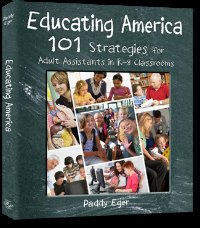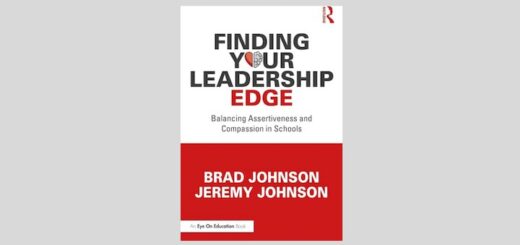Training Parents to Help in School
Educating America: 101 Strategies for Adult Assistants in K-8 Classrooms
By Paddy Eger
(Tendril Press, 2011)

If you listen to mainstream media, America’s public schools are failing However, Americans generally think positively about the public schools in their own communities. Mandates from federal and state governments are causing teachers to do many things that take valuable time away from the things that matter most – children. Good teachers know what’s best for kids and learning. Teachers know parents have much to offer their own children, other children, teachers and their school’s community.

The goal of her book is to help teachers train adults to be confident volunteers. I spent many years learning to be a teacher, so it makes perfect sense that parents and volunteers need to be trained. I knew this to be true but didn’t know where or how to start. Eger draws on her experiences as a volunteer, a volunteer organizer and a teacher to help those of us wishing to utilize such a rich resource. I know parental involvement is good for kids; however, the job of training seems so big. I simply did not know where to start. Thanks to Eger, I have many valuable tips and resources for getting started. While I am not a classroom-based teacher now, I can see myself giving the initial training to lay important groundwork.
Each chapter goes into detail about the skills volunteers need in order to be successful. Eger provides examples to clarify what she is proposing as well as examples of language volunteers might use with students. Language is so important! Also she stresses the importance of students taking ownership and becoming creative and independent learners. Having parents in the classroom would foster more understanding about what happens in classrooms and why some things are done. A deeper understanding might then help parents develop their own voices in addressing lawmakers.
The book is set up as follows:
- Chapter 1: Prepare to Assist
- Chapter 2: Set Expectations
- Chapter 3: Communicate Effectively
- Chapter 4: Expand Questioning Strategies
- Chapter 5: Deal with Misbehavior
- Chapter 6: Develop Thinking Skills
- Chapter 7: Monitor Student Progress
- Chapter 8: Clarify Details
- Chapter 9: Wrap-Up
- Chapter 10: Mostly for Teachers
- Chapter 11: Mostly for Adult Assistants
- Chapter 12: Mostly for Parents
Throughout each chapter, Eger made me stop and think about the things I do automatically and would not think to articulate to a parent volunteer. When I plan to train parent volunteers, I will reread Chapter 10 first and then reread the different chapters to help plan the trainings for my school. The Appendix provides useful resources like 101+ Jobs Adults Can Do To Assist Teachers, Planning for Adult Assistants, and an Adult Assistant Inventory.
Eger cautions about the amount of time it will take to train and prepare volunteers. Training volunteers is not a one-stop shop. She built her volunteer program over many years and refined her trainings. The things she was able to do with volunteers range from group projects to helping students one on one. She revealed many things parents could do from providing support, enrichment, and tutoring, to lending a helping hand.
She also explains that her ideas are not all inclusive and perfect for every school. The one thing that would be beneficial everywhere is having parents as partners in learning. Training parents is one of the very few time-consuming endeavors that provides what’s best for kids.
Karen Linch is a Title I Reading Teacher in Wooster, Ohio who loves helping the most at-risk readers because they give her a run for her money every single day. She believes all kids can and will learn to read. It’s up to the adults in their world to figure out how best to teach them. Karen thinks all teachers should be on Twitter; nothing can touch the site’s professional development opportunities available 24/7.



































